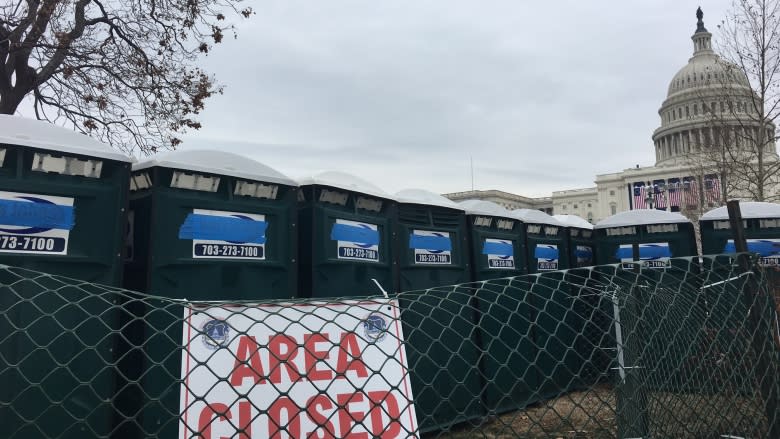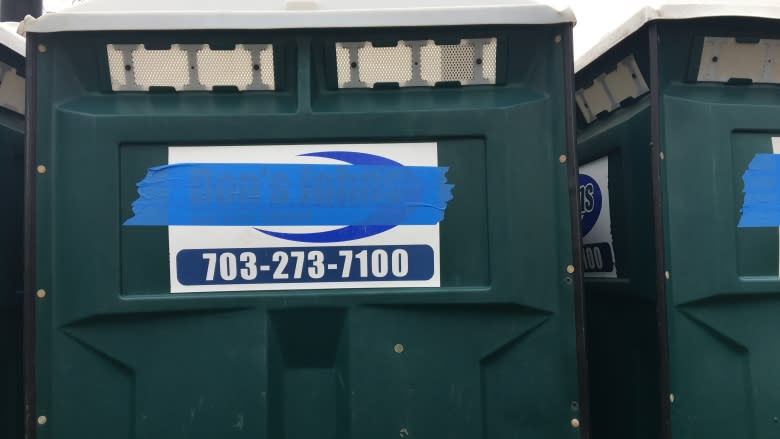Inauguration sets tone for presidency — but doesn't always go as planned
It's not clear if commander-in-chief-to-be knows yet, but you have to wonder how he would feel about a porta-potty company lining D.C.'s streets with awkwardly yet coincidentally named "Don's Johns."
Some of the labels have been taped over — perhaps for fear of offending the president-elect? Not all are covered, mind you, just those that seem to be at risk of being seen by pesky camera operators during the swearing-in ceremony. On whose orders did that happen?
Rob Weghorst, CEO of Don's Johns, is miffed. He told his workers to pull off the tape.
"We like our names on our units" he told Texas-based conservative news and entertainment network TheBlaze.
Surely a business mogul-turned-almost-president would get that.
Nixon pelted with tomatoes and rocks
But if protecting the soon-to-be leader of the free world from mocking and potty jokes was the motivation for the tape-over by some loyal inaugural workers, that would fall in line with a tradition of going to odd lengths to keep presidential embarrassment at bay.
Richard Nixon's team in 1973 was certainly determined to stave off sneers — and for good reason.
Nixon's first inauguration, in 1969, amidst the ugliness of the Vietnam War, featured horse manure lobbed at the ball-gowned guests of Vice-President Spiro Agnew. Nixon's motorcade to the White House was hit with tomatoes and rocks.
Second time around, they had another shot at managing as much of the imagery as possible.
Worried, or so the story goes, about pigeons, uh, raining on his parade, the inaugural committee was asked to spray a chemical in the trees to stop pigeons from roosting in them and doing what comes naturally all along Pennsylvania Avenue.
Only, according to inauguration historian Jim Bendat, the pigeons weren't repelled by the chemical. They ate it. And it killed them. So it was pigeon carcasses that plopped onto the streets instead. Whoops.
'A display about ego'
Apparently planning teams can be too careful.
Bendat, who has studied some 200 years' worth of inaugurations, says each one has a feel.
"I'm going to be watching to see if Donald Trump tries to make this all about himself," said Bendat, author of Democracy's Big Day, all about the curiosities of inauguration days. "It has never veered into a display about ego, and I hope this will not be the case now."
Technically, constitutionally, all that really has to happen is the administering of the 35-word oath of office. All else has developed as a mix of tradition and patriotism.
The speech, parade and inaugural balls are, foremost, supposed to represent American ideals. But a hint of the president-elect's character always creeps in.
It was a tone of simplicity Jimmy Carter was going for in 1977 when he walked the two-kilometre stretch from the Capitol to the White House and passed on the fancy lunch with congressional VIPs.
It was a failed nod to populism for Andrew Jackson in 1829. Fancying himself the first outsider president, he opened the White House to an after-party for the people. It was a great idea until drunken hordes trashed the place and Jackson had to bolt out a window.
Trump aiming for 'soft sensuality'
Wisely, most of the parties, including the traditional lunch, have now been moved away from the White House. And those lunches have mercifully evolved from the "corned beef sandwich on the run" days of the 1800s, according to Prof. Elizabeth Goldsmith of Florida State University. As an expert on the daily lives of first families, she is waiting to read the tea leaves of the congressional lunch menu. The food choices, she says, will reveal much about the new president, as they did with Barack Obama.
"Bison and apples — he was very much an apple guy," she said. The food usually reflects the home state of the president. Bowls of apples were often found in the Oval Office.
And Trump? Goldsmith says not much is known about what Donald Trump likes to eat, so this first lunch will set the pace for White House cuisine.
As much as she'd love to get her hands on it, the menu is a secret for the moment. And politically touchy.
"Broccoli farmers wouldn't be happy if they learned there wasn't a plan to serve it," she says, as one example of how fraught the menu co-ordination can be.
It's all so sensitive. And it's soon to be telling about the tone of the presidency ahead. President-elect Trump has the finances for the biggest, splashiest inauguration of all. His fundraising efforts have so far gathered nearly $90 million. That's almost double what Obama raised, and his 2009 inauguration broke records for attendance and expense.
So will be it bigger, louder, fancier? Apparently not.
Tom Barrack, the head of Trump's inaugural committee, told reporters last week that the ultimate plan is to surround Trump's inauguration in the "soft sensuality" of the place.
Where to begin with that.



